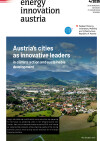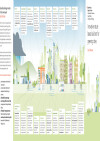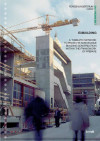Suchergebnisse
Eco-Mobility 2025 - Fostering Competitiveness of Vehicle Industry – From Research to Application
13. - 14. November 2025
Palais Palffy, Wien, AT
Eco-Mobility is a two-day conference on competences and up-to-date developments. Representatives of OEMs and suppliers, of energy providers and R&D institutions as well as public and funding authorities report on activites and strategies in the respective field and the Austrian automotive sector is represented by the A3PS members.
ISGAN Webinar: Lighthouse Foresight and Strategic Decision Making - The Solutions
01. October 2025
online, AT
Foresight and strategic intelligence play crucial roles in the long-term strategic planning of future resilient distribution grids, particularly in uncertain and complex environments like those related to the energy transition and climate change mitigation and adaptation.
Sozial100%Erneuerbar: 100% renewable heating and cooling supply in social housing - the demonstration project Käthe-Dorsch-Gasse
100 % renewable (on-site) heating and cooling supply in social housing while achieving good living comfort. Implementation, monitoring and optimisation of an overall heating and cooling system that has not yet been implemented in this combination (especially in social housing).
LOW TECH innovation-lab - real laboratory for the transformation to climate and resource-saving energy regions with innovative LOW TECH solutions
LOW TECH innovation-lab aims to set up an innovation laboratory in which innovative model solutions are developed, tested and widely rolled out in cooperation with suitable pilot regions on the basis of an optimized approach with regard to the use of technology on the one hand and the potential of the circular economy, local environmental resources and social innovations on the other.
CoolAIR - Predictive control of natural nighttime ventilation and daylight-optimized shading for passive building cooling
Natural nighttime ventilation and daylight-optimized shadowing are high potential approaches to efficiently and economical cool buildings. Nevertheless, the full potential cannot be acquired, since, if at all, such behavior is manually initiated by users. Goal of this project is the development of an automated, self-learning system that can assess the full cooling capabilities and establish an alternative to conventional air conditioning systems.
Ice-storage NEW - New economical ice storage concept for optimized heat storage using heat pumps and peak use of wind power
Development of a technically and economically optimized new ice-storage concept as a thermal wind power peak storage and to improve the performance of heat pumps as a contribution for peak smoothing of the electrical load profile.
IEA HPT Annex 67: Digital Services for Heat Pumps
Digital services such as advanced modelling, big data methods and augmented reality are not yet widespread in the heat pump industry, although they can be essential for market penetration and decarbonisation. It will be analysed how such services can be used over the life cycle, especially for product design/testing, integration, and operation/maintenance. Expertise from R&D and practice will be collected in an international database and disseminated in the industry.
Shaping the industrial future – making energy systems more flexible and paving the way for a circular economy
11. November 2025, 13:30 – 17:30
BMIMI, Radetzkystraße 2, 1030 Vienna, Room EA08
The future of industry is flexible, circular, and climate-neutral. But how can we successfully shape this transformation, accelerate the path toward climate neutrality and overcome practical challenges along the way? Join leading national and international experts from research and industry to explore cutting-edge research projects and exchange insights on sustainable industrial transformation.
Climate neutrality roadmap St. Veit/Glan
St. Veit/Glan aims at advancing to a beacon for other small Austrian towns by developing strategies, measures and for building the capacity, necessary for achieving climate neutrality by 2040.
Austria’s cities as innovative leaders

Austria’s cities as innovative leaders in climate action and sustainable development.
Herausgeber: BMIMI in cooperation with the Climate and Energy Fund
Englisch, 12 Seiten
Downloads zur Publikation
IEA EBC Annex 86: Energy Efficient Indoor Air Quality Management in Residential Buildings
Residential buildings should be able to provide good indoor air quality while ensuring high comfort and low energy use at lowest possible cost. This project will develop methods and compile data to evaluate different indoor air quality management strategies. Furthermore, innovative control strategies will be evaluated and tested in order to develop concrete recommendations for possible implementations of innovative ventilation systems for residential buildings.
IEA-SHC Task 64: Solar Process Heat
The IEA SHC Task 64/IV promotes the integration of solar thermal energy into industrial heating systems through standardised concepts, simulation tools and market strategies. The focus was on the development of modular integration solutions, the combination with heat pumps and the evaluation of simulation methods. The ‘Guideline to Market’ offers strategies for market launch. The results support companies and politicians in establishing SHIP as an efficient and scalable technology.
IEA ISGAN Communication Working Group
The ISGAN Communications Working Group prepares results, best practices, and insights from the TCP ISGAN in various communication formats. This includes interactive workshops with internal and external stakeholders, webinars, and policy papers presented at the Clean Energy Ministerials. In addition, the ISGAN Knowledge Tool was developed, which will be further enhanced in the follow-up project.
Making the Circular Economy Work
29. March 2023, 14:00-15:30
online
The speakers will go through various aspects of the circular economy, from bioenergy to industrial and urban symbioses, including local strategic planning. How can European cities and municipalities become circular? Should they develop a cross-sectoral circular economy strategy or focus on specific areas? What are the areas where the circular model can be applied?
Folder: Innovative nature based solutions for greening cities

Densely built-up areas, the associated soil sealing and a lack of green spaces are enormous challenges in times of climate change. The folder shows a variety of ways in which innovative greening technologies can help cities adapt to climate change.
Herausgeber: BMK (2020)
Mehrsprachig, 2 Seiten
Downloads zur Publikation
Urban cooling demand in Austria 2030/2050 (UKÖ 2030/2050)
Systematic processing of the increasing cooling demand and presentation of the geographical location of the cooling demand in Austria. The result serves as a decision-making aid for the development of climate protection measures and climate change adaptation strategies as well as an estimate of future cooling demand.
Webinar: Fostering grassland opportunities, circular business models and skills for resilient rural communities
8. June 2023, 14:00 - 16:00 CEST
Online
This webinar aims to discuss circular business models and capacity building activities including green biorefineries and funding instruments.
Smart Grids Week Salzburg 2013
E3 Building

A thematic network to promote sustainable building constructio within the framework of PREPARE
1/2001
Herausgeber: BMVIT
Englisch, 6 Seiten
Downloads zur Publikation
Renewable resources in the building sector

Investigation of factors which support and hinder acceptance: Technical, legal/political and organisational levels considered, focus on innovative solutions with high market potential, thematic focal areas: straw bale building, surface treatment, acoustic and thermal insulation
